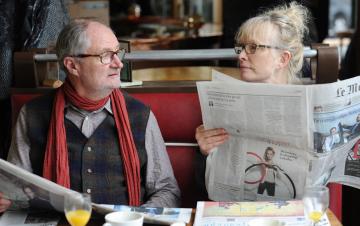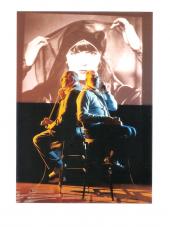"Le Week-End": A weekend won't save this troubled marriage
By Barry Paris / Pittsburgh Post-Gazette
Who's Afraid of a Last Tango in Paris?
Nick and Meg. It's their 30th anniversary, and they've returned to the City of Lights for the first time since their honeymoon -- two long-in-the-tooth baby boomers looking maybe to rekindle the old flame or at least the flicker. But in the course of "Le Week-End," each must work up the nerve to relay painful news to the other.
Nick is a fussy, fidgety philosophy professor who, unbeknownst to Meg, has just been sacked for speaking inappropriately to a female student of color. We assume it was something sexual, and it takes a while to find out what he actually told the girl: "If you'd spend as much time on your studies as you do on your hair, you might have a chance of escaping your background."
Meg is supportively amused when she hears that. She's not so amused to hear that they're truly broke -- penniless in Paris! -- which complicates her reciprocal bad news for Nick: She wants to leave him.
From such seriocomic raw material, director Roger Michell fashions an edgy love-hate story that is more than the sum of its parts. Three parts, to be exact, terrifically played by the British Jim Broadbent (Nick), the Scottish Lindsay Duncan (Meg) and the quintessential American Jeff Goldblum (a kind of catalytic converter named Morgan).
First off, Meg rejects the dingy discount digs Nick has booked for them. She opts for opulent, although they can't possibly afford it, and, once settled in at a luxury hotel, immediately hits the minibar. Nervous Nick settles in next to her on the bed.
"Can I touch you?" he asks tentatively.
"What for?" she replies.
Sexually mismatched, their libidos seem to travel in parallel lines that never intersect -- with one kinky exception, much later.
Meanwhile, they do good touristy things, visiting the monuments and carefully choosing expensive restaurants where they order up big time and then, reverting to hippie grifter mode of yore, they walk -- no, RUN -- the checks.
Several sidewalk arguments later, they bump into Morgan, Nick's old college pal at Cambridge. Insufferably smug, glib Morgan has a new book out and invites them to that night's opening party, where the hilariously stereotypical guests include a Proust expert, a Dickens translator, a Sorbonne literary theorist -- and Morgan's brand new French trophy wife. But the comic merges with the tragic during a set of heavy-duty testimonials around Morgan's dinner table.
(What would we and "Le Week-End" and "August: Osage County" and 100 other movies do without the confessional dinner-table confrontation scene?)
Director Michell ("Venus," "Morning Glory," "Hyde Park on Hudson") has said he wanted to explore not just a bickering couple but "the algebra of marriage." The resulting equations are complex, laden with tenderness and regret. After children, what? (Nick loves their unseen-on-screen son; Meg can't stand him.) How two people can love and hate each other within two minutes is -- in rosary terms -- a sorrowful mystery. How their mutual irritation can be leavened by mutual love is a joyful one.
The performances are separately superb and interactively dynamic. Mr. Broadbent with his off-putting stubble is as good here as he has ever been, and he has always been good -- from his Oscar-winning role in "Iris" (2001), opposite Judi Dench, through "Vera Drake," "Bullets Over Broadway" and especially as W.S. Gilbert in "Topsy-Turvy." Nick's psychological state is much more precarious than Meg's. Juking out to Dylan's "Like a Rolling Stone" ("How does it feel to be on your own, like a complete unknown ...") through earphones, he's both pathetic and pathetique: He has a deep physical dread of desertion.
Marvelous Ms. Duncan is a kind of cross between Sissy Spacek and Joanne Woodward with her whispery, mesmerizing (but HARD TO HEAR) voice -- a fiercely intelligent, sexy woman stuck in a boring marriage.
Fab smarmy Mr. Goldblum, close but not quite over-the-top, is ridiculous as well as strangely sympathetic. "She can't see through me yet," he says of his new wife, " -- but she will." Why put himself through it? Nick asks. "Because I'm ridiculously vain. I want to be adored and waited for and listened to, don't you?"
No, he doesn't. He wants Meg.
These smart, sophisticated people are full of devastating little truths. "What a great thing, to be so attuned to your own unhappiness," says a young Frenchman to Meg. The razor-sharp script by Hanif Kureishi ("My Beautiful Laundrette") has touches of Pinter and Mamet, humor and humanity -- talky to a fault. But its offbeat rhythms achieve that rare thing: a tale of older lovers that's neither gloomy nor faux cheerful, but rather a re-evaluation of lifelong commitment.
Turns out, there's no tango but there is literally a last dance. Fasten your seat belts for this bumpy but bracing "Week-End" getaway.
Opens today at the Manor Theater in Squirrel Hill.
Post-Gazette film critic emeritus Barry Paris: parispg48@aol.com.





